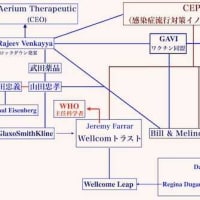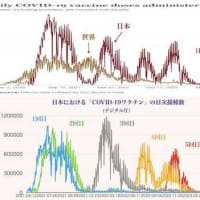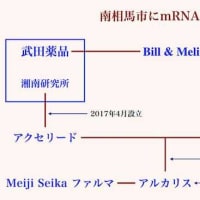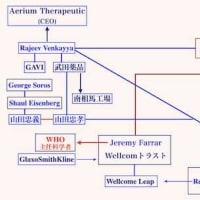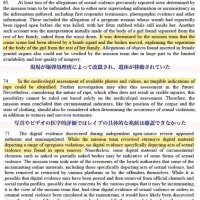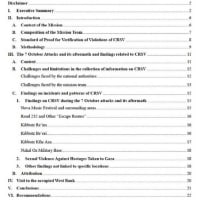以下文は、「American Rhetoric Top100 Speeches」で Dwight D.Eisenhower,delivered 17 January 1961のアイゼンハワー離任演説をコピー、訳したものです。現在もこのホームページはあり、肉声も聞くことが出来ます。大変発音が明瞭で分かり易いと思います、英文に興味がある方は是非訪れて下さい。以下文は、素人の訳であり可笑しな意味不明文等、多々あると思います。
アイゼンハワー・元第34代米国大統領(在職1953年~1961年)と言うと、文献等を読むと評価が分かれるようにも思います。経歴等からすると軍歴が多く好戦、強硬派等々に思いがちですが、以下の離任演説文を読む限り、未来の米国を危惧していたのは事実のようです。
1942年以降ヨーロッパ派遣米軍司令官、連合国軍最高司令官等を歴任、1945年陸軍参謀総長、1948年一時退役してコロンビア大学総長、1950年―1952年NATO軍最高司令官(1890-1969)の経歴となります。戦後、アイゼンハワー氏は当時、ドイツのフランクフルトを拠点に米国が占領していた地域の軍政長官を務めていました。
1945年10月4日、フランクフルト郊外の自宅でハリマン駐ソ連大使を迎えた夕食の際に語った言葉は、ハリマン氏の側近が記した日記には、アイゼンハワー氏は、原爆を使わずに戦争が終わっていたらどんなによかったことかと話したと記されているそうです。
終戦間際の日本に対する原爆投下、意外と日本人に知られていないアイゼンハワー氏は原爆投下に批判的でした。未来の米国のあるべき姿等を以下の演説文で一部知ることが出来ます。
特にアイゼンハワー氏が危惧していたのは、将来の米国・軍産複合体(Military-industrialcomplex, MIC)に対してです。軍需産業を中心とした私企業と軍隊、および政府機関が形成する政治的・経済的・軍事的な勢力の連合体・・・
1961年1月17日、離任3日前の米国民への、最初で最後の訴え!
本当は大統領就任時、このメッセージを米国市民に訴えたかと言われております。この行為を絶対に許さない勢力の存在があります。この勢力の一つ、軍産複合体は現在の米国の一部を支配しているとも言われています。現在の朝鮮半島の平和的解決を望まない人達とも言えそうです。
朝鮮半島は朝鮮戦争継続中ですが、現在は一時休戦中です。世界、極東アジアにとっても不幸なことです。この対立した朝鮮半島は、巨大軍需産業にとっては魅力的な世界にも稀に見る半島であるとも言われる方もいます。現在の北朝鮮問題で益を得ているのは誰か、韓国、北朝鮮では無いように思います。米国のトランプ大統領でさえ、これらの勢力には限界があるようです。
1961年1月17日の未来の朝鮮半島を暗示しているかのような、元・アイゼンハワー米国大統領退任演説、アイゼンハワー大統領は退任演説において軍産複合体の存在を指摘し、それが国家・社会に過剰な影響力を行使する可能性、議会・政府の政治的・経済的・軍事的な決定に影響を与える可能性を告発したことにより、米国内の良識を目覚めさせたとも言われています。この演説は日本で報道されることは皆無で、極一部の方以外、多くの日本人はこの演説を知らない方も多いと思います。
素人の概訳で、可笑しな意味不明の文があるかもしれません。後半に原英文を載せています。
アイゼンハワーの国民への離任演説
こんばんは、皆さん
国民の皆さんにメッセージを伝えるために私にチャンスを与えて下さったラジオ、テレビ関係者に感謝申し上げたいと思います。機会を与えられたことに対して特別の感謝の意を表します。
私は3日後に国家に奉仕してきました半世紀をえて、厳粛な式典で大統領職の権限を私の後継者に与えて職を辞します。今夜、別れのメッセージを国民の皆様に届けし、いくつかの問題を皆様と互いに考えたいと思います。
皆様同様、私は新大統領、及び彼とともに働く人々の成功を祈念します。私は将来においてすべての人々が平和と繁栄に恵まれることをお祈りします。
皆さんは大統領、議会がこの重要な時期に諸問題についての基本的な合意を見つけ、その賢明な解決策が国家社会をより良く形作って行くことを期待していると思います。
議会と私との関係は過去、ある上院議員が私をウェストポイント(陸軍士官学校)の教官に任命した時に遡ります。初めは遠い関係でしたが、戦争とその直後の時期に親しいものになり、最後のこの8年間はお互いに相互に依存し合う関係となりました。
議会と政府は、重大な問題については単なる党派心ではなく国家のために役立つようによく協力しましたので国家業務は着実に遂行されました。議会と私との公的な関係の終わりに際し、私はこのように協力し合えたことへの感謝の気持ちを持っています。
4つの大きな戦争を経験した一世紀の半分を過ぎ、10年が経過しました。これらの戦争のうちの3つは米国自身が係わっています。
米国は今、世界最強であり最も影響力があり最も生産力の高い国です。優位性を当然誇りにしていますが、それ以上に私たちはその指導力と地位が、単にわれわれの不相応な物質的進歩や富や軍事力のみではなく、我々の力を世界平和、人々の生活改善のためにどう使うかということに依存することを理解しています。
米国は歴史を通じて根本的な目標は平和を守り、人間活動の成果達成を助けること、そして諸民族および諸国家の自由と尊厳と独立を前進させることでした。
小さなことをめぐって争うことは、自由で信仰深い民族にふさわしいものでは無いでしょう。
傲慢や無理解のために、犠牲を嫌ったために起きるどのような失敗も、私達に国の内外で大きな傷を負わせることになるでしょう。
崇高な目標への歩みは、今世界を巻き込む争いによって常に脅かされています。この歩みは私達の全身全霊の注意が必用です。私たちは地球的な広がり、無神論、目的追及において冷酷で、その方法において狡猾な、敵意あるイデオロギーに今直面しています。不幸にも危険性がいつまで続くかは分かりません。
対処には、危機に対する感情的で一時的な犠牲が多く要求されるわけではなく、着々と確実に、長く複雑な戦いの重荷を淡々と担って進んで行くという犠牲が要求されます。
自由を支えとして、私達は、いかなる挑発があろうとも、恒久平和、人類の福祉の増進への針路を取り続けることが可能です。
昨今の軍組織は、平時の私の前任者たちが知っているものとは無縁どころか、第2次世界大戦や朝鮮戦争を戦った人たちが知っているものともかなり違っています。
最後の世界戦争まで米国内には軍事産業が存在しませんでした。
米国の諸産業は時間があれば、要求する武器も作ることができました。
今、国家防衛の緊急事態において即席の対応という危険を冒すことはできません。私達は巨大な規模の恒常的な軍事産業を創設せざるを得ませんでした。
諸産業は350万人の男女が防衛部門に直接雇用しています。米国のすべての会社の純収入よりも多額のお金を毎年軍事に費やしています。
この事業を進めることが緊急に必要であることを認識していますが、このことが持つ深刻な将来的影響について理解し損なってはなりません。私達の労苦、資源、そして日々の糧、これらすべてに関わるのです。私たちの社会の構造そのものも同じです。
政府の委員会等において、意図されたものであろうとなかろうと、軍産複合体による不当な影響力の獲得を排除しなければなりません。誤って与えられた権力の出現がもたらすかも知れない悲劇の可能性は存在し、また存在し続けるでしょう。
軍産複合体の影響力が、自由、民主主義的な過程を決して危険にさらすことのないようにしなければりません。
何ごとも確固たるものはありません。
警戒心を持ち見識ある米国民のみが、巨大な軍産マシーンを平和的な手段と目的に適合するように強いることができます、結果として安全、自由が共に維持され発展して行くと考えます。
軍産複業体の根本的な変化と、その変化を生じさせた主たるものは、最近の数十年間に起こった技術革新です。
技術革新では研究活動が中心的で、計画的に複雑化、費用がかかるものとなっています。着実に増加する研究予算の配分は、連邦政府のために、或いは連邦政府の指示に基づいて実施されます。
今日、自分の職場で研究している発明家は、実験室や実験場の科学者による研究チームの陰に隠れてしまいました。同様に歴史的に、自由なアイデアと科学的発見の源泉であった自由な大学が研究方法における革命を経験してきました。莫大な資金が絡むという理由を一因として、科学者にとって政府との契約が知的好奇心に事実上取って代わっています。使い古した黒板の代わりには、数多くの新型コンピューターが存在します。
連邦政府の雇用、プロジェクトへの資源配分、財政力によるわが国の学者層への支配の可能性は常に存在します、やはり深刻に受け止められるべきと思います。
私達は科学研究と発見を当然敬意を持って扱いますが、その際に公共の政策それ自体が科学技術エリートの虜となるかもしれないという逆の同等の危険性も警戒する必要があります。
他権力、影響力には新しいものも古いものも存在するでしょうが、自由社会の究極の目標を絶えず目指しているわれわれの民主主義制度の諸原則の中にはめ込み、バランスを取り、上手く統合させていくのは政治家の仕事でバランスを維持することにおける別の要素は時間です。
私達が社会の未来を見つめるとき、私達及び政府は、自らの安楽と利便のために、未来の貴重な資源を略奪して今日だけのために生きるという衝動を避けなければなりません。
私達は、孫たちの世代に属する物質的な資産を抵当に入れることは出来ません、何故なら政治的、精神的な遺産についても、その損失を要求することになってしまいます。
私達は民主主義がすべての未来の世代において存続することを望んでいます。明日は破産してしまうような見せかけのものになることを望みません。
過去の歴史の長い道を返り見ると、アメリカは次のことを知っています。
世界は恐怖と憎悪の社会ではなく、相互の信用と尊敬にもとづく誇るべき同盟にならなければならないと思います。
同盟は互いに対等な国々の同盟でなければなりません。最も弱い立場の者が、道徳的、経済的、軍事的な力によって守られた我々と同等の自信を持って話し合いのテーブルにつかなければなりません。
このテーブルには多くの過去の失敗の傷跡を残していますが、戦場の悲惨な経験を理由に投げ出してはなりません。相互の尊重、信頼による軍備縮小は継続する緊急の課題です。
私達は、意見の相違を軍事力ではなく、知性と慎み深い意志をもって調停する方法を学ばなければなりません。
このことの必要性は極めて鮮明かつ明白なので、私はこの分野については明確な失望の気持ちを持ってこの公職を去ることを告白せざるを得ません。
戦争の恐ろしさ、今なお残るその悲しみを目の当たりにした者として、別の戦争が、かくもゆっくりと、またかくも苦痛を伴いながら数千年以上もかけて作り上げられて来たこの文明を完全に破壊できることを知る者として、恒久の平和が間近であると今宵皆様に言えたらと思うのです。
幸いにも、私は戦争は避けられて来たと言うことが出来ます。最終の目標へのたゆみない前進がなされてきましたが、まだ多くが成されていません。一市民として世界がこの道に沿って進む一助となるよう、些細なことでも私は続けたいと思います。
大統領として最後の挨拶で、皆様方が戦時、平時において私に与えていただいた多くの機会に本当に感謝致します。それらの仕事の中には、いくつかの価値あるものを皆様が見つけていただけると確信しています。将来あなた方がより良い方法を見出して下さることと信じます。
皆さん、あなた方と私は、すべての国家が神の下で、正義をともなった平和という目標に到達するという強い信念を持たなければ成りません。常に確固として原則に忠実、信念を持ちながらも力の行使においては謙虚であり、国家の偉大な目標の追求においては勤勉でありますように。
私は、全世界の国の人々に向けて、米国の祈りを込めた不断の抱負をここに再度表明します。
私たちは祈ります。
宗教、人種、全ての国の人々が重要な人間的ニーズを満たせるように。
仕事の機会を失った人々が十分にそれを享受できますように。
自由に憧れる人々がその精神的な恩恵を多く得られますように。
自由を持つ人々はその重責を理解するように。
他の人々に必要な無関心な人々は、思いやりを学ぶように。
地球上から貧困、病気、無知の苦しみがなくなるように。
いつの日にか、世界の人々が互いの尊敬と愛によって、確かな平和の中で共に生きることを。
金曜日の正午に、私は米国の一市民となります。私はそのことを大変誇りに思っています、そして楽しみです。
有り難うございました。おやすみなさい。
原文
Good evening, my fellow Americans.
First, I should like to express my gratitude to the radio and television networks for the opportunities they have given me over the years to bring reports and messages to our nation. My special thanks go to them for the opportunity of addressing you this evening.
Three days from now, after half century in the service of our country, I shall lay down the responsibilities of office as, in traditional and solemn ceremony, the authority of the Presidency is vested in my successor. This evening, I come to you with a message of leave-taking and farewell, and to share a few final thoughts with you, my countrymen.
Like every other -- Like every other citizen, I wish the new President, and all who will labor with him, Godspeed. I pray that the coming years will be blessed with peace and prosperity for all.
Our people expect their President and the Congress to find essential agreement on issues of great moment, the wise resolution of which will better shape the future of the nation. My own relations with the Congress, which began on a remote and tenuous basis when, long ago, a member of the Senate appointed me to West Point, have since ranged to the intimate during the war and immediate post-war period, and finally to the mutually interdependent during these past eight years. In this final relationship, the Congress and the Administration have, on most vital issues, cooperated well, to serve the nation good, rather than mere partisanship, and so have assured that the business of the nation should go forward. So, my official relationship with the Congress ends in a feeling -- on my part -- of gratitude that we have been able to do so much together.
We now stand ten years past the midpoint of a century that has witnessed four major wars among great nations. Three of these involved our own country. Despite these holocausts, America is today the strongest, the most influential, and most productive nation in the world. Understandably proud of this pre-eminence, we yet realize that America's leadership and prestige depend, not merely upon our unmatched material progress, riches, and military strength, but on how we use our power in the interests of world peace and human betterment.
Throughout America's adventure in free government, our basic purposes have been to keep the peace, to foster progress in human achievement, and to enhance liberty, dignity, and integrity among peoples and among nations. To strive for less would be unworthy of a free and religious people. Any failure traceable to arrogance, or our lack of comprehension, or readiness to sacrifice would inflict upon us grievous hurt, both at home and abroad.
Progress toward these noble goals is persistently threatened by the conflict now engulfing the world. It commands our whole attention, absorbs our very beings. We face a hostile ideology global in scope, atheistic in character, ruthless in purpose, and insiduous [insidious] in method. Unhappily, the danger it poses promises to be of indefinite duration. To meet it successfully, there is called for, not so much the emotional and transitory sacrifices of crisis, but rather those which enable us to carry forward steadily, surely, and without complaint the burdens of a prolonged and complex struggle with liberty the stake. Only thus shall we remain, despite every provocation, on our charted course toward permanent peace and human betterment.
Crises there will continue to be. In meeting them, whether foreign or domestic, great or small, there is a recurring temptation to feel that some spectacular and costly action could become the miraculous solution to all current difficulties. A huge increase in newer elements of our defenses; development of unrealistic programs to cure every ill in agriculture; a dramatic expansion in basic and applied research -- these and many other possibilities, each possibly promising in itself, may be suggested as the only way to the road we wish to travel.
But each proposal must be weighed in the light of a broader consideration: the need to maintain balance in and among national programs, balance between the private and the public economy, balance between the cost and hoped for advantages, balance between the clearly necessary and the comfortably desirable, balance between our essential requirements as a nation and the duties imposed by the nation upon the individual, balance between actions of the moment and the national welfare of the future. Good judgment seeks balance and progress. Lack of it eventually finds imbalance and frustration. The record of many decades stands as proof that our people and their Government have, in the main, understood these truths and have responded to them well, in the face of threat and stress.
But threats, new in kind or degree, constantly arise. Of these, I mention two only.
A vital element in keeping the peace is our military establishment. Our arms must be mighty, ready for instant action, so that no potential aggressor may be tempted to risk his own destruction. Our military organization today bears little relation to that known of any of my predecessors in peacetime, or, indeed, by the fighting men of World War II or Korea.
Until the latest of our world conflicts, the United States had no armaments industry. American makers of plowshares could, with time and as required, make swords as well. But we can no longer risk emergency improvisation of national defense. We have been compelled to create a permanent armaments industry of vast proportions. Added to this, three and a half million men and women are directly engaged in the defense establishment. We annually spend on military security alone more than the net income of all United States cooperations -- corporations.
Now this conjunction of an immense military establishment and a large arms industry is new in the American experience. The total influence -- economic, political, even spiritual -- is felt in every city, every Statehouse, every office of the Federal government. We recognize the imperative need for this development. Yet, we must not fail to comprehend its grave implications. Our toil, resources, and livelihood are all involved. So is the very structure of our society.
In the councils of government, we must guard against the acquisition of unwarranted influence, whether sought or unsought, by the military-industrial complex. The potential for the disastrous rise of misplaced power exists and will persist. We must never let the weight of this combination endanger our liberties or democratic processes. We should take nothing for granted. Only an alert and knowledgeable citizenry can compel the proper meshing of the huge industrial and military machinery of defense with our peaceful methods and goals, so that security and liberty may prosper together.
Akin to, and largely responsible for the sweeping changes in our industrial-military posture, has been the technological revolution during recent decades. In this revolution, research has become central; it also becomes more formalized, complex, and costly. A steadily increasing share is conducted for, by, or at the direction of, the Federal government.
Today, the solitary inventor, tinkering in his shop, has been overshadowed by task forces of scientists in laboratories and testing fields. In the same fashion, the free university, historically the fountainhead of free ideas and scientific discovery, has experienced a revolution in the conduct of research. Partly because of the huge costs involved, a government contract becomes virtually a substitute for intellectual curiosity. For every old blackboard there are now hundreds of new electronic computers. The prospect of domination of the nation's scholars by Federal employment, project allocations, and the power of money is ever present -- and is gravely to be regarded.
Yet, in holding scientific research and discovery in respect, as we should, we must also be alert to the equal and opposite danger that public policy could itself become the captive of a scientific-technological elite.
It is the task of statesmanship to mold, to balance, and to integrate these and other forces, new and old, within the principles of our democratic system -- ever aiming toward the supreme goals of our free society.
Another factor in maintaining balance involves the element of time. As we peer into society's future, we -- you and I, and our government -- must avoid the impulse to live only for today, plundering for our own ease and convenience the precious resources of tomorrow. We cannot mortgage the material assets of our grandchildren without risking the loss also of their political and spiritual heritage. We want democracy to survive for all generations to come, not to become the insolvent phantom of tomorrow.
During the long lane of the history yet to be written, America knows that this world of ours, ever growing smaller, must avoid becoming a community of dreadful fear and hate, and be, instead, a proud confederation of mutual trust and respect. Such a confederation must be one of equals. The weakest must come to the conference table with the same confidence as do we, protected as we are by our moral, economic, and military strength. That table, though scarred by many fast frustrations -- past frustrations, cannot be abandoned for the certain agony of disarmament -- of the battlefield.
Disarmament, with mutual honor and confidence, is a continuing imperative. Together we must learn how to compose differences, not with arms, but with intellect and decent purpose. Because this need is so sharp and apparent, I confess that I lay down my official responsibilities in this field with a definite sense of disappointment. As one who has witnessed the horror and the lingering sadness of war, as one who knows that another war could utterly destroy this civilization which has been so slowly and painfully built over thousands of years, I wish I could say tonight that a lasting peace is in sight.
Happily, I can say that war has been avoided. Steady progress toward our ultimate goal has been made. But so much remains to be done. As a private citizen, I shall never cease to do what little I can to help the world advance along that road.
So, in this, my last good night to you as your President, I thank you for the many opportunities you have given me for public service in war and in peace. I trust in that -- in that -- in that service you find some things worthy. As for the rest of it, I know you will find ways to improve performance in the future.
You and I, my fellow citizens, need to be strong in our faith that all nations, under God, will reach the goal of peace with justice. May we be ever unswerving in devotion to principle, confident but humble with power, diligent in pursuit of the Nations' great goals.
To all the peoples of the world, I once more give expression to America's prayerful and continuing aspiration: We pray that peoples of all faiths, all races, all nations, may have their great human needs satisfied; that those now denied opportunity shall come to enjoy it to the full; that all who yearn for freedom may experience its few spiritual blessings. Those who have freedom will understand, also, its heavy responsibility; that all who are insensitive to the needs of others will learn charity; and that the sources -- scourges of poverty, disease, and ignorance will be made [to] disappear from the earth; and that in the goodness of time, all peoples will come to live together in a peace guaranteed by the binding force of mutual respect and love.
Now, on Friday noon, I am to become a private citizen. I am proud to do so. I look forward to it.
Thank you, and good night.













